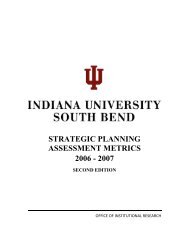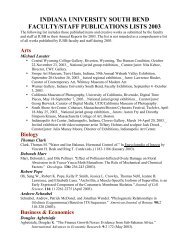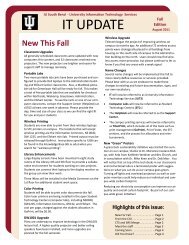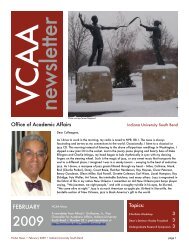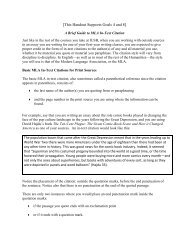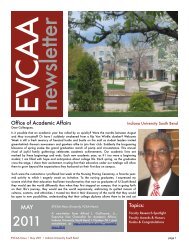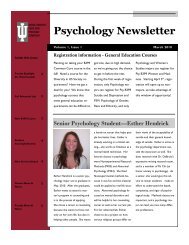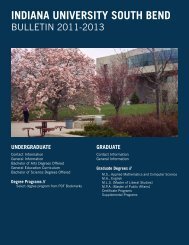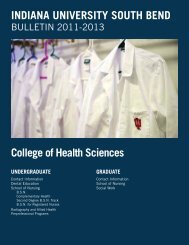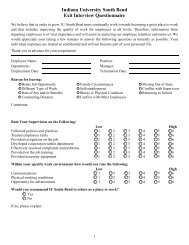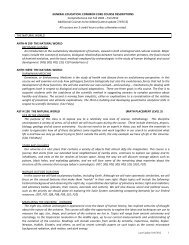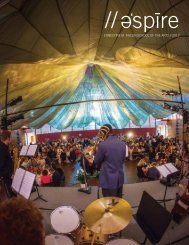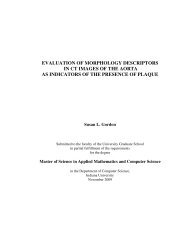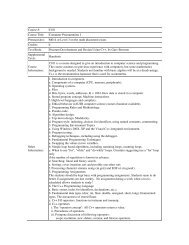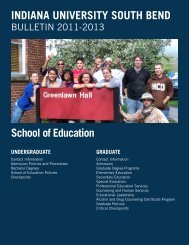Current version - Indiana University South Bend
Current version - Indiana University South Bend
Current version - Indiana University South Bend
You also want an ePaper? Increase the reach of your titles
YUMPU automatically turns print PDFs into web optimized ePapers that Google loves.
3723 IU SOUTH BEND COURSE DESCRIPTIONS<br />
NURS-K 499<br />
NURS-N 502<br />
NURS-N 504<br />
NURS-R 500<br />
NURS-R 590<br />
NURS-S 470<br />
NURS-S 471<br />
Genetics and Genomics (3 CR.)<br />
P: R.N.-B.S.N. student or sophomorelevel.<br />
This course introduces a basic<br />
knowledge of genetics in health<br />
care, including genetic variation and<br />
inheritance; ethical. Legal, and social<br />
issues in genetic health care; genetic<br />
therapeutics; nursing roles; genetic basis<br />
of selected alterations to health across the<br />
life span; and cultural considerations in<br />
genetic health care are all considered.<br />
tHEORY i (3 cr.)<br />
Focus is on evaluating the factors and<br />
issues influencing the development of<br />
theory in nursing. Theoretical terminology<br />
and criteria for the evaluation of theories<br />
are examined. Linkages applied between<br />
theory, practice, and research are<br />
explored. II<br />
leadership for advanced nursing<br />
practice (3 cr.)<br />
Course addresses core competencies as<br />
leadership, role, health care economics,<br />
policy, and the law and ethics that are<br />
essential to all advanced nursing practice<br />
roles and health care in complex systems.<br />
I<br />
NURSING RESEARCH METHODS i (3 cr.)<br />
This course provides a survey of research<br />
in nursing, including critique of research<br />
literature, research designs, sampling,<br />
data collection and measurement<br />
strategies, relation of research and theory,<br />
development of researchable problems,<br />
and theory utilization. I<br />
Scholarly project (1-3 cr.)<br />
P: NURS-R 500 A guided experience<br />
in identifying a researchable nursing<br />
problem and in developing and<br />
implementing a research proposal. S<br />
RESTORATIVE HEALTH for SYSTEMS (3 cr.)<br />
P: All junior-level courses. C: NURS-S 471.<br />
This course focuses on the pathophysiology<br />
and nursing care management of clients<br />
experiencing multi-symptom alterations<br />
in health status. Correlations among<br />
complex system alterations and nursing<br />
interventions to maximize health<br />
potential are emphasized. I, II<br />
RESTORATIVE HEALTH RELATED TO MULTI-<br />
SYSTEM FAILURES: THE PRACTICUM (2 cr.)<br />
C: NURS-S 470. The students apply<br />
the nursing process to the care of<br />
clients experiencing acute multi-system<br />
alterations in health. I, II<br />
NURS-S 472<br />
NURS-S 473<br />
NURS-s 474<br />
NURS-S 475<br />
NURS-S 481<br />
A MULTI-SYSTEM APPROACH TO THE<br />
HEALTH OF THE COMMUNITY by R.N.-<br />
B.S.N. (3 cr.)<br />
P: All junior-level courses. C: NURS-S<br />
473. This course focuses on the<br />
complexity and diversity of groups or<br />
aggregates within communities and their<br />
corresponding health care needs. Through<br />
a community assessment of health trends,<br />
demographics, epidemiological data, and<br />
social/political issues in local and global<br />
communities, the student can determine<br />
effective interventions for communitycentered<br />
care. I, II<br />
HEALTH OF THE COMMUNITY: PRACTICUM<br />
(2 cr.)<br />
C: NURS-S 472. Students have the<br />
opportunity to apply the concepts<br />
of community assessment, program<br />
planning, prevention, and epidemiology<br />
to implement and evaluate interventions<br />
for community-centered care to groups<br />
or aggregates. Professional nursing is<br />
practiced in collaboration with diverse<br />
groups within a community. I, II<br />
applied health care ethics (3 cr.)<br />
This course is designed to introduce the<br />
student to major ethical theory, principles,<br />
and models for the recognition, analysis,<br />
and resolution of ethical dilemmas in<br />
health-care practice.<br />
A Multisystem Approach to the<br />
Health of the Community R.N.-B.S.N.<br />
(3 CR.)<br />
P: R.N.-B.S.N. student. Basic<br />
epidemiological principles and<br />
community health nursing models are<br />
applied in collaboration with diverse<br />
groups. Disease prevention strategies are<br />
applied to individuals and populations<br />
to promote health. Students apply the<br />
concepts of community assessment,<br />
disease prevention, and health promotion<br />
to plan, implement, and evaluate<br />
interventions for populations in the<br />
community.<br />
NURSING MANAGEMENT (2-3 cr.)<br />
P: All first semester senior-level courses<br />
and all general education requirements<br />
except one 3 credit hour course. C:<br />
NURS-S 482. This course focuses on<br />
the development of management skills<br />
assumed by professional nurses, including<br />
delegation, networking, facilitating<br />
groups, conflict resolution, leadership<br />
and collaboration. Concepts addressed<br />
include patient safety, clinical judgment,<br />
complexity, change, managing quality<br />
P = Prerequisite, R = Recommended, C = Concomitant, VT = Variable Title<br />
I = fall semester, II = spring semester, S = summer session(s)



